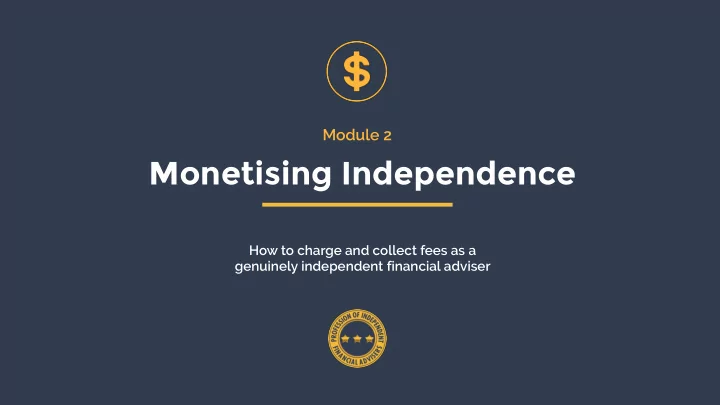

Module 2 Monetising Independence How to charge and collect fees as a genuinely independent financial adviser
What’s happening in the mind and heart of your client What your client wants from a Recap of relationship with you The meaning of independence Module 1 … Arguments for and against maintaining conflicts of interest Conflicts of interest: the slippery slope
Preparing for Module 2 Homework: your fee matrix List all clients you derived revenue from last year Calculate the total revenue received for each client Break that revenue down by method collected Specify whether it was one-off or recurring
Agenda… Module 2: Monetising How to calculate your fees How to collect fees Independence When you collect fees How to charge and collect fees as How you renew your fees a genuinely independent financial Bridging the ‘value gap’ adviser Protecting your independence
The “ideal” financial adviser 86% Would prefer to pay for their advice directly rather than via a commission Would be more likely to invest in a longer 83% term relationship if they knew their adviser was genuinely independent
“I want to charge this” Adviser The Value Gap The difference between what a consumer wants to pay and what a provider wants to charge … Client “I will happily pay this”
Calculating your fees The tension Charging too much and losing the prospect between … Not charging enough and leaving money on the table
Examine the underlying assumptions 1 Advice The ASIC’s views … 2 Implementation
Calculating your fees Costs Complexity The compliance Time department’s views … Skill/experience Responsibility/risk Urgency
“worth it” Resolving fee tension (over-charging) “not worth it”
“enough” Resolving fee tension (under-charging) “not enough”
Bridging the value gap “Walk a mile in their moccasins”
Commissions & product payments Asset fees: % of FUM/FUA Flat or fixed fee Hourly rate Remuneration Pros and Retainer options Cons Task-based Tier-based
Flat or Fixed fee Known quantity Simple to understand, easy to explain Expectations can drift Scope creep
Hourly rate Transparent, clear, unarguable Focus on work, not outcome Can erode engagement Scrutiny on efficiency and work Infrastructure requirements
Retainer Predictable, regular income Fosters an ‘at call’ expectation Value delivery must be consistent Unpredictable workflow
Task-based Simplicity and clarity Natural flow to outcomes Project management approach Transactional relationship
Tier-based Simple Inaccurate pricing method Slippery slope to possible conflicts Limited application Slippery slope to conflicts
The slippery slope … Conflicts of Platform rebates … with strings attached interest Commission offsets … on less than commercial terms or duty Tiered structures … too close to product transactions
Cash or cheque ETF, DD, PP Collecting Credit or debit card Fees Deducted from platform Paid from product
When to collect fees At the start At the end Along the way Combination
Renewing fees More than a transaction Enduring relationship Threat: complacency/apathy
“Fee For No Service” FOFA – annual FDS – biennial Opt-In Annual, in advance, Opt-In Fee deductions limited < 12mths
Calculating your fees Bridging the value gap Recap … Fee model pros and cons Collecting and renewing fees Conflicts of interest: the slippery slope
Assessment & Resources Monetising Independence Required reading resources Multiple Choice questions Complete to unlock the next Module Resources carry CPD points
Agenda… Module 3: Your ‘IFA DNA’ Delivering value Service structures Minimum service standards Establishing what services you “Fees For No Service” risks will provide as an independent Setting clear service expectations financial adviser
Preparing for Module 3 Homework: your service matrix How many planned meetings were held? How many client-initiated meetings were held? What services did the client receive?
Final words … Leaving the old world forever.
Recommend
More recommend